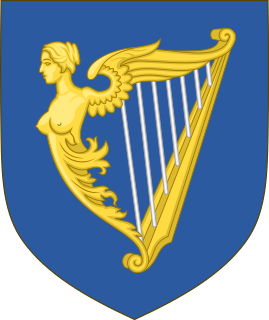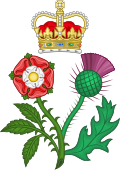
The Parliament of the United Kingdom is the supreme legislative body of the United Kingdom, the Crown dependencies and the British overseas territories. It alone possesses legislative supremacy and thereby ultimate power over all other political bodies in the UK and the overseas territories. Parliament is bicameral but has three parts, consisting of the sovereign (Crown-in-Parliament), the House of Lords, and the House of Commons. The two houses meet in the Palace of Westminster in the City of Westminster, one of the inner boroughs of the capital city, London.

The Parliament of Great Britain was formed in May 1707 following the ratification of the Acts of Union by both the Parliament of England and the Parliament of Scotland. The Acts created a new unified Kingdom of Great Britain and dissolved the separate English and Scottish parliaments in favour of a single parliament, located in the former home of the English parliament in the Palace of Westminster, near the City of London. This lasted nearly a century, until the Acts of Union 1800 merged the separate British and Irish Parliaments into a single Parliament of the United Kingdom with effect from 1 January 1801.

The Parliament of Ireland was the legislature of the Lordship of Ireland, and later the Kingdom of Ireland, from 1297 until 1800. It was modelled on the Parliament of England and from 1537 comprised two chambers: the House of Commons and the House of Lords. The Lords were members of the Irish peerage and bishops. The Commons was directly elected, albeit on a very restricted franchise. Parliaments met at various places in Leinster and Munster, but latterly always in Dublin: in Christchurch Cathedral, Dublin Castle, Chichester House (1661–1727), the Blue Coat School (1729–31), and finally a purpose-built Parliament House on College Green.

The first Parliament of the Kingdom of Great Britain was established in 1707 after the merger of the Kingdom of England and the Kingdom of Scotland. It was in fact the 4th and last session of the 2nd Parliament of Queen Anne suitably renamed: no fresh elections were held in England, and the existing members of the House of Commons of England sat as members of the new House of Commons of Great Britain. In Scotland, prior to the union coming into effect, the Scottish Parliament appointed sixteen peers and 45 Members of Parliaments to join their English counterparts at Westminster.
This is a list of the parliaments of the United Kingdom, of Great Britain and of England from 1660 to the present day, with the duration of each parliament. The NP number is the number counting forward from the creation of the United Kingdom in 1801 and Great Britain in 1707. Prior to that, the parliaments are counted from the Restoration in 1660.
Hythe was a constituency centred on the town of Hythe in Kent. It returned two Members of Parliament to the House of Commons until 1832, when its representation was reduced to one member. The constituency was abolished for the 1950 general election, and replaced with the new Folkestone and Hythe constituency.
St Mawes was a rotten borough in Cornwall, England. It returned two Members of Parliament (MPs) to the House of Commons of England from 1562 to 1707, to the House of Commons of Great Britain from 1707 to 1800, and to the House of Commons of the United Kingdom until it was abolished by the Great Reform Act in 1832.
Northumberland, was a County constituency of the House of Commons of the Parliament of England then of the Parliament of Great Britain from 1707 to 1800 and of the Parliament of the United Kingdom from 1801 to 1832. It was represented by two Members of Parliament.
Ludgershall was a parliamentary borough in Wiltshire, which elected two Members of Parliament (MPs) to the House of Commons from 1295 until 1832, when the borough was abolished by the Great Reform Act.
Heytesbury was a parliamentary borough in Wiltshire which elected two Members of Parliament. From 1449 until 1707 it was represented in the House of Commons of England, and then in the British House of Commons until 1832, when the borough was abolished by the Reform Act 1832.
Winchelsea was a parliamentary constituency in Sussex, which elected two Members of Parliament (MPs) to the House of Commons from 1366 until 1832, when it was abolished by the Great Reform Act.

Phillips Gybbon, of Hole Park, Rolvenden, in Kent, was an English Whig politician who sat in the House of Commons between 1707 and 1762.

As a result of the union of Scotland with England and Wales and the creation of the Parliament of Great Britain in 1707, Scotland had 48 constituencies representing seats for 45 Members of Parliament (MPs) in the House of Commons of the new Parliament of Great Britain, normally at the Palace of Westminster. Westminster was previously the meeting place for the Parliament of England, which covered both England and Wales.
Samuel Kent was an MP for Ipswich in the 8th, 9th, and 10th Parliament of Great Britain, sitting from 23 January 1735 to his death in 1759.
Beaumaris was a parliamentary borough in Anglesey, which returned one Member of Parliament (MP) to the House of Commons of the Parliament of England from 1553, then to the Parliament of Great Britain from 1707 to 1800 and to the Parliament of the United Kingdom from 1801 to 1885, when the constituency was abolished. After 1832, the constituency was usually known as the Beaumaris District of Boroughs or simply the Beaumaris Boroughs.

William Aislabie of Studley Royal, North Yorkshire was an English landowner and Tory politician who sat in the House of Commons for over 60 years from 1721 to 1781. His long unbroken service in the House of Commons was only surpassed, more than 100 years after his death, by the 63 years achieved by Charles Pelham Villiers at Wolverhampton.

The House of Commons of Great Britain was the lower house of the Parliament of Great Britain between 1707 and 1801. In 1707, as a result of the Acts of Union of that year, it replaced the House of Commons of England and the third estate of the Parliament of Scotland, as one of the most significant changes brought about by the Union of the kingdoms of England and Scotland into the Kingdom of Great Britain.
John Leland was a General in the British Army and Member of Parliament serving in the House of Commons of Great Britain
Robert Beatson, LL.D. FRSE FSA (1741-1818) was a Scottish compiler and miscellaneous writer.








